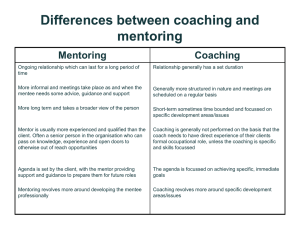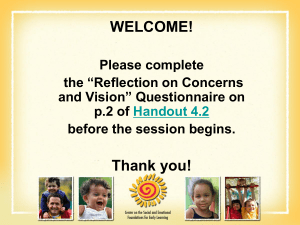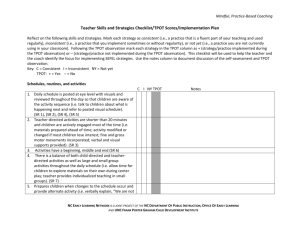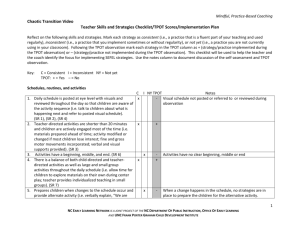Coaching Early Educators: - University of South Florida
advertisement
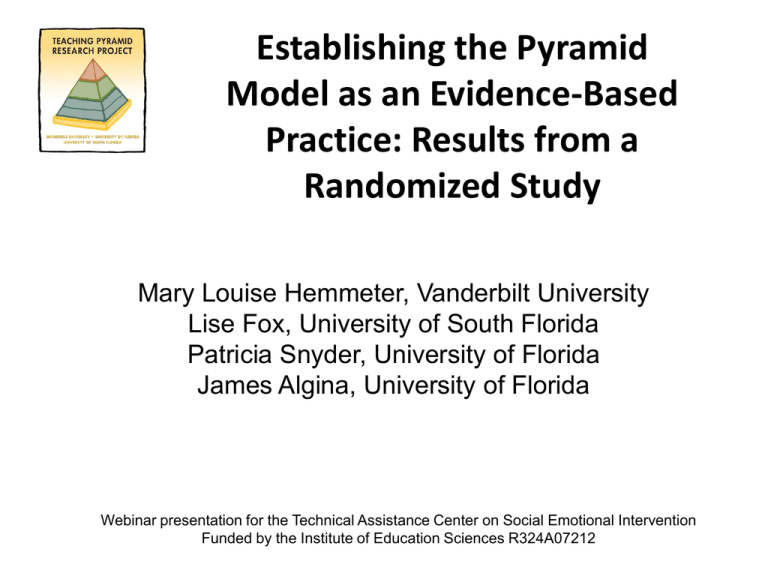
Establishing the Pyramid Model as an Evidence-Based Practice: Results from a Randomized Study Mary Louise Hemmeter, Vanderbilt University Lise Fox, University of South Florida Patricia Snyder, University of Florida James Algina, University of Florida Webinar presentation for the Technical Assistance Center on Social Emotional Intervention Funded by the Institute of Education Sciences R324A07212 Pyramid Model 2 Research Questions • Do teachers who have received professional development (PD) focused on the Pyramid Model implement those practices with fidelity when compared to teachers who have not received PD on Pyramid Model practices? • Do the social skills and problem behaviors of children whose teachers have received professional development on the Pyramid Model differ from children whose teachers have not received professional development? • Do the positive social interaction skills of target children with challenging behavior whose teachers have received professional development on the Pyramid Model differ from children whose teachers have not received professional development? Evaluating the Potential Efficacy of the Teaching Pyramid Model: Theory of Change Professional Development Guides & Materials Workshops Coaching Contextual Variables Teachers’ Frequent and Accurate Use of TPOT Practices Children’s Social and Behavioral Competence Methods • Public school classrooms – Nashville, Tennessee – Tampa, Florida – 2 Cohorts • Randomized group design – One between-subjects factor (Teaching Pyramid intervention) and one within-subjects factor (repeated measures) – Randomized at the classroom level • 20 Intervention and 20 control teachers • 2-3 Target children in each classroom – (identified through the Caregiver Teacher Report Form of the Child Behavior Checklist) Methods Continued • Intervention teachers received: – 3 days of training (19.5 hours) – Implementation guides and materials – Weekly observation, coaching sessions, and email feedback (mean=13.4, range 7-17) • Control teachers received training at end of study Coaching Framework Components • Entry and Relationship Building • Goal Setting and Action Planning • Observation • Debrief, Reflect, and Feedback Impact of Professional Development on Preschool Teachers’ Use of Embedded Instruction Practices (Project Number R324A070008) Phases of Coaching • Early Sessions (Sessions 1 to ~ 3) – – – – Entry and relationship building Observation Needs assessment and initial goal setting Debrief and Feedback • Reflection • Supportive feedback only • Latter Sessions (Sessions ~ 4 and beyond) – – – – Continued relationship building Observation Goal setting Debrief and feedback • Reflection • Supportive and corrective feedback • Final Session – Strategies for sustaining – Additional resources – Evaluation of coach and coaching processes Impact of Professional Development on Preschool Teachers’ Use of Embedded Instruction Practices (Project Number R324A070008) Coaching Strategies • Watch teacher and take detailed • notes • • Collect data • • Engage in a problem-solving • discussion • Engage in a reflective conversation • • Review goals • • Update action plan progress • • Provide performance feedback • (verbal or graphic) • Deliver side-by-side support (verbal or gestural) • Model target practices Role-play Videotape teacher Review teacher’s video Share a video demonstration Help teachers use / interpret data Provide materials or resources Modify environmental arrangement Provide other help in classroom Coaching Debriefing Protocol • Open meeting • Summarize observation and encourage reflection • Supportive performance feedback • Corrective performance feedback • Targeted support • Support for planned actions • End meeting Impact of Professional Development on Preschool Teachers’ Use of Embedded Instruction Practices (Project Number R324A070008) Debriefing Session Using Data in Feedback Hi Ms Fox , This email is meant to summarize our last meeting together, and hopefully wrap up anything we said we would do before we meet again. I know it is sometimes hard for you to see, but I am truly amazed at how much your children have grown in such a short period of time. Look at your little Andy, he heard the clean-up song and started cleaning up his center without anyone prompting or helping him. I wanted to jump out of my chair, awesome! I know you are working alone most days and are feeling overwhelmed, but take my word for it you have done a great job at creating nurturing relationships, and a high quality learning environment for all your students. As I shared yesterday, all the children were very engaged in circle time. 1. All the kids really seem to get the circle rules, now we just have to be consistent and purposeful in the way we are teaching the center time rules. Remember to review them with the whole group before they are released from centers, check to make sure they are understanding, and help them to practice each rule during non-crisis times. Most of them know what is expected of them, so we may need to individualize for a couple of our little friends who are having trouble following each rule. I think that Claire and Javier might benefit from extra practice several times a day using the visual mini-rule cards. 2. Your class is doing a great job at working together and taking turns, hopefully the new sharing book will help them to start working on that skill. It's going to be a hard one for some of them, so you will need to review and give them lots of opportunities to practice with you there to guide them. But I think your idea of selecting one skill to work on at a time is perfect and hopefully they will get this sharing thing figured out quickly. I am planning to see you again on Friday the 26th . Send me an email to confirm this is still good for you. Its been great to collaborate with you. I am looking forward to our next session. Hang in there, thanks for everything you do! Denise open the e-mail provide supportive performance feedback provide corrective performance feedback provide targeted support support planned actions end the e-mail Dose • Length of coaching = 12-16 weeks • Mean number of sessions = 13 (range 7 to 17) • Mean session duration (min): – Early sessions • Observation = 144 (R = 85-205) • Debrief = 44 (R = 10-135) – Sessions 3 and Beyond • Observation = 105 (R= 30 – 305) • Debrief = 38 (R = 15- 105) Coaching Fidelity Early Sessions (n = 40) Sessions 3 and Beyond (n = 219) Email (n = 204) Closing Sessions (n = 10) All Sessions (n = 473) Number of sessions with fidelity (percent) 14 (35) 73 (33.33) 78 (38.24) 3 (30) 168 (35.51) Mean percentage of procedural fidelity (range) 79.2 (45.45-100) 88.84 (50-100) 88.62 (37.5-100) 89.74 (76.92-100) 86.6 (37.5-100) 15 Strategies used in Early and Latter Coaching Observations Debriefing Strategies used in Early and Latter Coaching Sessions Measures • Observational Measures – Early Childhood Environment Rating Scale – Revised (ECERS) – Teaching Pyramid Observation Tool (TPOT) – Classroom Observation Scoring System (CLASS) – Target Child Observation System • Teacher Report – Social Skills Improvement System • Measurement Schedule – Four waves, 7-8 weeks apart Teaching Pyramid Observation Tool (TPOT) • The TPOT was developed to measure the extent to which Teaching Pyramid practices are being implemented in a classroom • Provides information that can be used to: – Describe “quality” of implementation of TPOT practices – Compare implementation within and across teachers/classrooms – Identify needs of teachers for training and support • Psychometrically sound Results: Implementation of Teaching Pyramid Practices Figure 1. Mean Teaching Pyramid Observation Tool implementation scores across waves by experimental condition. Total number of TPOT indicators = 108. Statistically significant and noteworthy differences at Wave 4 [t(40.03)=6.80, p<.001, Cohen’s d=2.6) Results: SSIS Child Outcomes Adjusted Means Intervention Control Cohen’s d Effect Size Target Children Social Problem Behavior 88.6 108.7 84 115.5 .41 -.52* 103.8 95.2 96.4 99 .46* -.29 Non Target Children Social Problem Behavior Results: Target Child Social Interactions Figure 2. Mean frequency of positive social interactions during 60 min observation session across waves for Cohort 1 target children whose teachers were in the intervention or control condition. An average of the frequency of positive social interactions for the 2 to 3 target children in each classroom was used to derive the means reported for each group at each wave. Results: Implementation Moderates/Mediates Social Skills Discussion • Teaching Pyramid Observation Tool – Does not measure delivery of intensive interventions to an individual child – Does not measure density or “dosage” of implementation • Measures of Child Outcomes – SSIS as primary outcome measure • Reliance on teacher report • Did we change child behavior or teacher perceptions of “what is challenging behavior”? – Direct Measurement of Child Outcomes • How do we collect enough observational data to get an accurate estimate of behavior given limited resources? • No measure of pre-academic skills/school readiness • Executive function measures Implications • Effectiveness of the professional development approach – Standardized protocol – Sufficient dosage • Fidelity of implementation is related to improved child social and behavioral outcomes • Some issues to consider: – What approaches to training and coaching are effective? How might we combine different coaching approaches? How do teacher characteristics influence coaching processes? – Do we need different coaching formats or different dosages of coaching for targeted practices (e.g., descriptive praise, pre-correction) versus multi-component interventions? – How might program wide implementation affect dosage of coaching needed for fidelity? Acknowledgements • • • • • • • • • • • • • • • • Kathleen Artman Meeker Kiersten Kinder Denise Binder Shelley Clarke Tara McLaughin Jessica Hardy Alana Schnitz Jessie Morris Kelly Feeney-Kettler Burak Aydin Francisco Jimenez Beverly Hand Claudia Meiler Carrie Spitz Emmie Robinson Liz Lewis • • • • • • • • • • • • • • • • Nikki Beitler Andrea Dewey Liz Will Geoff Ferris Darcie Sperber Adrienne Golden Jenna Shepcaro Liz Will Sonya Frazier Jillian Penrod Shannon Wood Jenny Rodriguez Krystal McFee Amye Bock Theresa Skipper Stephanie Demian




